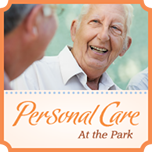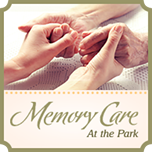As Alzheimer’s disease or any other form of dementia progresses in the brain of a loved one, it makes it increasingly difficult to communicate with them. This disease blocks neuron connections and inhibits information from being shared within the brain to the rest of the body. As a result, even the smallest of conversations can be very difficult to get through with someone who has Alzheimer’s disease. However, there are techniques you can utilize so both parties can communicate with one another smoothly. They are as follows:
Be Patient
It’s very difficult for an Alzheimer’s patient to find the right word or the correct phrase to accurately describe what they’re feeling or what they want. As a result, it’s very important that you remain patient with them. Don’t get frustrated. Show the person that you’re trying your very hardest to understand what they want. This assures that everyone keeps a level head and no one gets discouraged.
Offer Reassurance
As frustrating as it is for you to understand a person with Alzheimer’s disease, it’s even more frustrating for them to try and communicate. This is definitely something that we take for grant it on a daily basis. Therefore, offer them reassurance when they may become frustrated. Can you imagine what it would be like to really need something, but lack the ability to ask for it? Plus, if you don’t offer any reassurance they may become dismayed and give up on talking all together. Don’t let this happen. Be supportive. Encourage them to express what they want, even if they’re having a really hard time explaining it.
Don’t Criticize
One thing you should try to avoid is criticizing their response. Don’t tell them they’re wrong, or that they are not using the correct word or phrase. That will only make them more upset and flustered. Instead, refrain from correcting them. Just sit back and listen to what they have to say. You should try and piece together what it is that they want. If you are able to decipher what they really want, politely point out that they mean something else, and that they should try using a different word or phrase.
Limit Distractions
If the TV is on or there is music being played, those sounds compete with your loved one’s attention. They may focus more on what is happening on the screen or become familiar with a song being played on the radio. This will limit their ability to communicate what is on their mind. There’s nothing wrong with having your loved one watch their favorite show or listen to their favorite tunes. However, if you’re trying to have a good, solid conversation with them, it’s best to turn off those distractions.
Keep It Simple and Specific
There’s no need to quote Shakespeare or look to your thesaurus to find long and difficult words. The same goes for directions given to your loved one. Keep it short. Keep it simple. You should also refrain from asking multiple questions at a time. It’s hard enough for your loved one to focus on one question let alone three that have been asked in a row. You should ask one at a time and wait for their response. This reduces the chance of confusion and frustration for everyone. Also, when you’re referring to something or someone, be specific. This will also help to reduce confusion, as vague sentences are confounding for everyone!
These simple techniques can make it much easier to converse with a loved one who has Alzheimer’s disease. It’s also important to note that non-verbal communication is very crucial as well. However, having a chat or exchanging words with someone who has a form of dementia is a good exercise for their brain. Do not rely heavily on non-verbal cues, because you’ll be doing that person a disservice. Nothing beats a good old-fashioned conversation with someone you cherish!
Since February is American Heart Month, it seems fitting that the next month is National Nutrition Month. In order to keep that heart healthy, one must continue on eating foods that facilitate a healthy lifestyle and not inhibit one. That’s why you should spend March celebrating this important awareness month by watching what you eat! Below are some excellent tips for monitoring what goes into your stomach.
Calcium and Vitamin D
These two nutrients are very important for older adults. As we age, we’re more susceptible to osteoporosis, which is a condition that makes our bones more fragile and brittle. Since bones are living tissue and they are constantly being broken down and replaced, it’s important to have enough calcium so the tissue can be replaced faster than it is depleted.
This is where Vitamin D comes in handy! This nutrient helps us absorb more calcium in our system. Luckily, scientists have realized this and found ways to fortify calcium rich foods with Vitamin D. You can find certain dairy products such as milk and yogurt that have it integrated into the food or drink.
Vitamin B
Red blood cells are vital to your overall health. They help carry oxygen in the blood to all parts of your body, especially your brain. Therefore, if you don’t have enough you can receive really bad shortness of breath or severe fatigue. That’s why Vitamin B is so important in your diet. It helps provide healthy red blood cells for your body.
Without healthy red blood cells, it’s also difficult to get oxygen to your nerves. They can also malfunction due to lack of oxygen. This is called neuropathy, and it’s relatively common in older adults. Some of the symptoms included in this deficiency are numbness, tingling, poor balance, and trouble walking. If you happened to lose some of your mobility recently, check to make sure it’s not a Vitamin B deficiency.
Previously, the only way to obtain Vitamin B was through meat and dairy products, but now you can get this supplement in a multivitamin. As stated previously, if you’ve noticed a decrease in your mobility, perhaps you should pick some up! Of course, it’s always wise to speak to your doctor first.
Potassium
This nutrient is one that is important to your heart health. It helps keep your blood pressure low and regulates your heart rate. It also reduces the amount of sodium that is in your blood. Not to mention, it’s an electrolyte so it helps to conduct electricity in your body. That may sound dangerous, but in reality all of your neurological impulses are electric so it helps make sure all messages being relayed around your body are being sent and received properly. As a result, it’s very important when it comes to muscle function. As mentioned previously, this includes the heart. It’s a very important nutrient.
In order to obtain the proper amount of it, potassium can be found in bananas. There’s a lot of potassium in this delicious fruit, but it can also be found in sports drinks. They’re always good to have after exercising or finishing a workout. However, if you’re just sitting around, they’re not the best to sip on. They have plenty of sugar in them, which can wreak havoc on your blood pressure and even your oral health.
It Doesn’t Stop Here
Of course, these aren’t the only nutrients you should be worried about. There are a multitude of other vitamins and minerals your body needs in order to operate at full capacity. We urge you to do a little more research on your own, in order to find out how to be the healthiest you! It’s no secret that when you’re up and active, you’re a much happier person when compared to being sedentary and stationary. Make sure you’re celebrating National Nutrition Month this March!
February plays host to a couple of awareness concerns. In addition to it being American Heart Month, it is also AMD and Low Vision Awareness Month. In order to celebrate this 28-day observation, it’s important to understand what AMD is and how it contributes to poor vision. It’s also important to learn how to manage it because AMD can lead to permanent loss of vision that cannot be reversed.
For Starters
AMD stands for Age-Related Macular Degeneration, and it’s the leading cause of vision loss, affecting over 10 million Americans. This is more than cataracts and glaucoma combined. It also mainly affects men and women over the age of 60.
When it comes to the anatomy of the eye, the macula is the spot on the back of the retina. Its primary function is to aid with central vision. As a result of its degeneration, blind spots occur in whatever you’re looking at that is straight ahead of you. It’s terribly distracting as it makes reading, driving, and even recognizing faces very difficult.
Unfortunately, the signs and symptoms of AMD are so slight that it may be difficult to realize your vision is becoming more and more blurry. Here are some important things to look out for!
Signs and Symptoms
- Blurred spot in the center of your vision
- Needing more light when reading
- Printed words are hard to read
- Colors seem duller
- Recognizing faces is more difficult
- Your overall vision is hazy
Although you cannot reverse the loss of vision that has already occurred, your eye doctor will be able to detect AMD and can come up with steps in order to prevent further loss of vision and manage this disease. That’s why it’s important to continue to schedule those eye doctor appointments. Just know that an AMD diagnosis does not symbolize the loss of freedom and independence. There are ways to manage this disease. There also factors that you can control in order to prevent it. However, there are also factors you cannot control.
Factors You Can Control
- Smoking – Tobacco restricts blood vessels and can diminish the amount of oxygen that your eyes receive.
- High Blood Pressure – This can damage the blood vessels around your eye
- Sunlight Exposure – Too much exposure to UV light can damage your retinas, which in turn, makes you more susceptible to AMD
- Diet and Exercise – Helps with blood flow throughout your entire body, reducing your chances of getting AMD
Factors You Can’t Control
- Age – As you age your chances of being diagnosed with AMD greatly increase.
- Gender – Women are more likely to be diagnosed with AMD
- Race – Caucasians are more likely to be diagnosed with AMD. This may be due to light eye color.
- Genetics – Those whose family members have been diagnosed with AMD have a greater risk of having the disease themselves.
What’s most important to know about AMD is that millions of people are diagnosed with it and living their lives normally. It does not mean you will go blind. It means you just need to learn how to manage your symptoms. Reading, watching TV, and even activities such as cooking will become a little more difficult. Don’t be discouraged! There are devices and strategies you can utilize in order to live your life the way you want to.
The term heart disease covers many different ailments that may affect, not only your heart, but also your blood vessels or even the way your heart beats. It’s synonymous with cardiovascular disease. As a result of the many conditions it covers, heart disease is the leading cause of death in America. It’s also 100% preventable. Therefore, we dedicated an entire month to heart healthy habits.
February is known as American Heart Month. During this awareness month, it’s best to make an extra effort in order to achieve a healthier heart. The reason heart disease is so high in this country is because it takes some careful examination of your diet and activity in order to maintain your cardiovascular health. February is the perfect month to whip yourself into shape. Below are some healthy tips you can turn into habits to make sure heart disease does not affect you!
Check your Blood Pressure
One of the leading causes of heart attacks or strokes is high blood pressure. People with high blood pressure are more than 4 times as likely to die from strokes and 3 times more likely to die from heart attacks. There are really no signs or symptoms of high blood pressure. You’ll only know it was too high too late. That’s why it’s important to always get screened when you visit your doctor. They will let you know where you are, where you should be, and what you need to do if it is in fact too high.
If you are worried about having high blood pressure, but can’t get to the doctor quicker than you’d like, some things you can do to reduce your blood pressure are:
- Quit smoking. Smoking restricts your blood vessels making it harder for blood to travel throughout your body. As a result, your blood pressure shoots through the roof.
- Limit your sodium intake. Sodium causes your body to hold on to extra water. This extra water places strain on your body and increases blood pressure. This extra blood pressure then places strain on your arteries causing them to thicken, which decreases flow and increases blood pressure even more. It’s a lose-lose.
Keep Moving
It’s no secret that the more you exercise the less likely you are to be affected by heart disease, and yet people still don’t do it. For only 30 minutes a day, you can greatly decrease your chances of a stroke or heart attack by simply walking, jogging, or performing some kind of resistance training. By doing so, you’re keeping the blood flowing, reducing your chances of problem #1 mentioned above. Not to mention, it reduces your cholesterol, causing your blood to flow more freely throughout the blood vessels, which again, leads to decreased blood pressure.
Watch Your Diet
As mentioned in the section about blood pressure, sodium is bad for your cardiovascular health. A diet that includes minimum salt and sodium, but a healthy balance of fruits, vegetables, and grains is key to maintaining weight and your overall health. It is also important to get your protein, however. You can’t cut meats out of your diet altogether, even though they contain a decent amount of sodium. A little bit of everything will not hurt you. Nevertheless, red meat is definitely the worst for you. You should eat it in moderation. White meat is a little better for you, and fish is really good for you.
Fish contains many healthy nutrients such as Omega 3’s. These nutrients are a form of fatty acids that are actually healthy for you! They aid in brain AND heart health. Unfortunately, due to ocean contamination, eating fish everyday of every week is not recommended. However, eating it once or twice a week will yield some healthy results.
Start Celebrating Today
February is the perfect month to start building a lifetime of heart healthy habits. Let American Heart Month be your reason to get in shape, eat healthy, and be a little more conscious about your health. Heart disease may be the leading cause of death in America, but we can change that. We can bring those numbers down together and prevent this disease altogether!
I have tried many times to write this note of appreciation to you and the staff at Personal Care at the Park for the wonderful care you provided to my mother during her last months of life.
Thinking back to the first day at The Park, my mother was greeted so warmly making her feel comfortable. I know she had the feeling she would be well taken care of, realizing how difficult daily life had become for her. A highlight for her days at The Park was eating delicious food in a well appointed dining room, attended to by a friendly wait staff. Having a choice of a meal, served on lovely plates, tables with tablecloths, and comfortable chairs gave the atmosphere of a restaurant. It was one of the few pleasures she had as she lost some of her independence.
This letter would go on forever if I named all the wonderful people who cared for and helped my mother. Everyone in all departments was friendly, engaging and accommodating. There are no words to fully express the competence, loving care, and support that the nursing staff gave my mother during her last days.
Gloria Dei Communities is honoring the memory of our Founder, Reverend Ernst (Ernie) G. Schmidt, following his passing on January 15, 2016.
As the Founding Minister of the Gloria Dei Lutheran Church in Huntingdon Valley, Ernie Schmidt was deeply moved in the early stages of his ministry by an encounter with an elderly couple struggling with their housing situation. That couple, unable to find affordable, safe housing in their senior years, had a profound effect on Ernie Schmidt at the time. The impact of that meeting moved him to become an advocate and pioneer in helping seniors to find safe and affordable housing in their later years. Vowing to do all that he could to fulfill his promise, Gloria Dei Communities was established and began its inception into an independent, thriving, non-profit organization dedicated to affordable and quality housing for seniors.
With Ernie Schmidt’s early mission established, Gloria Dei Towers, Gloria Dei Manor and Manor Court, Gloria Dei Estates, Gloria Dei Plaza, Gloria Dei Farms, Gloria Dei Personal Care at the Park and Gloria Dei Memory Care at the Park continued his vision and have been constructed and managed by the non-profit Gloria Dei Communities Corporation over the ensuing years. Each facility has been established to better serve seniors with affordable, quality housing through every stage of their later lives.
Gloria Dei Communities is grateful for Reverend Schmidt’s compassionate vision and offers our heartfelt condolences to his family.
For the Farm’s holiday drive this year, they chose to benefit an organization that makes a difference in the lives’ of the needy. Therefore, the community decided to donate to The Whosoever Gospel Mission in Germantown. This organization provides shelter, food, clothing, and rehabilitation to the homeless in the metropolitan area. Gloria Dei Farms collected socks, underwear, and personal hygiene items to help with their men’s ministry. In addition, a cash donation of $90.00 to the Ladies’ Auxiliary was made to help with the cost of the holiday dinner they provide and the Christmas stockings that they hand out.
The very first day that we walked in we could feel the warmth & love. It seemed to be everywhere. God bless them all!











